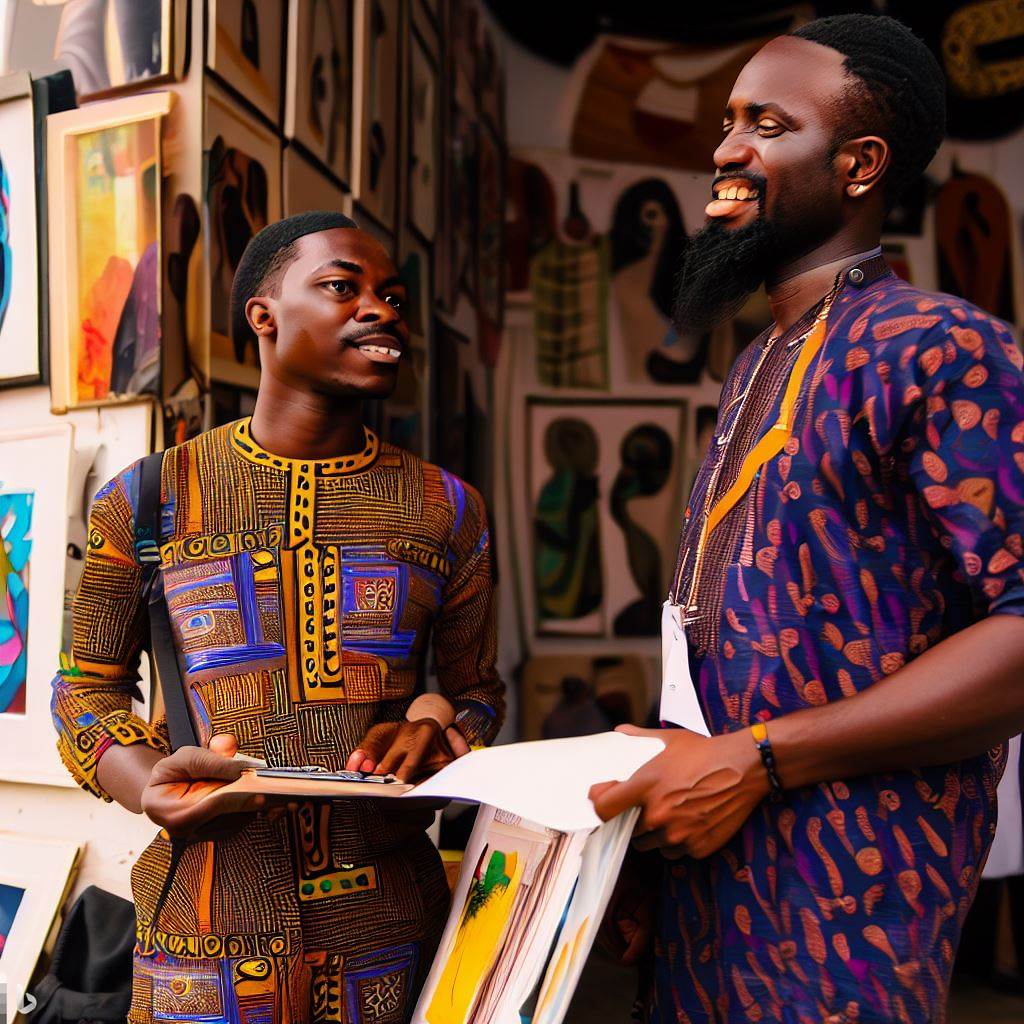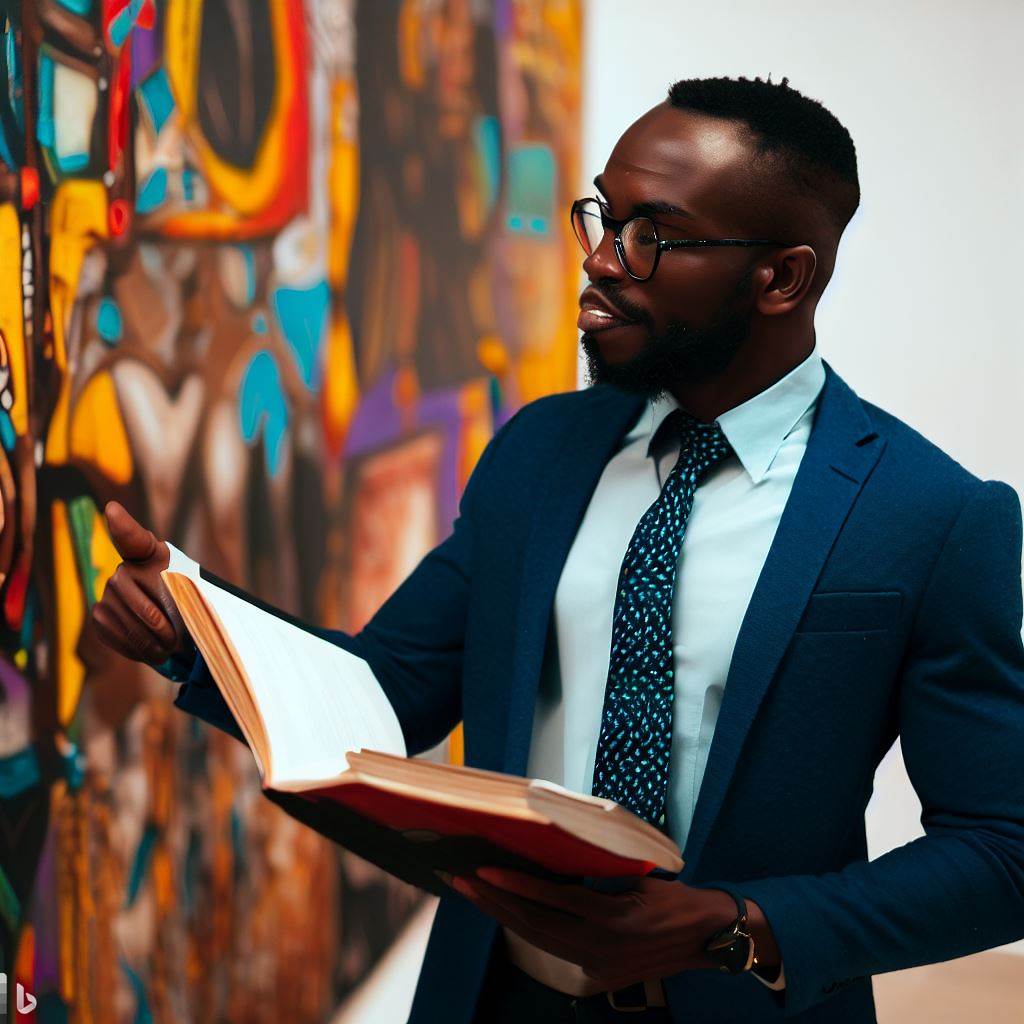Introduction
The Nigerian art scene
The Nigerian art scene is a dynamic and thriving community of diverse artistic expressions.
From traditional Nigerian art forms to contemporary installations, the country boasts a rich cultural heritage that is celebrated both locally and internationally.
In this bustling art scene, artists’ agents play a critical role in supporting and promoting artists.
With their extensive networks and expertise in the industry, agents act as intermediaries between artists and art collectors, galleries, and curators.
They help bridge the gap between artists and potential buyers, ensuring that their works receive the exposure they deserve.
Importance of artists’ agents in the art industry
The importance of artists’ agents cannot be overstated.
These professionals help artists navigate through various challenges they may face in the art industry.
They negotiate contracts, secure exhibition opportunities, and manage the business aspects of an artist’s career, allowing artists to focus on their creative process.
Furthermore, artists’ agents provide guidance and mentorship to emerging artists, helping them establish themselves in the competitive art market.
They offer valuable insights into trends, pricing, and marketing strategies, enabling artists to make informed decisions about their careers.
In a rapidly evolving art industry, the role of artists’ agents has become even more relevant.
With advancements in technology and globalisation, artists need competent professionals who can navigate the ever-changing landscape and connect them with opportunities worldwide.
To sum up, agents are essential allies for artists in Nigeria’s art scene.
They contribute to the growth and success of artists by providing vital support, networking opportunities, and expertise in the art industry.
As we delve deeper into navigating challenges in this blog section, we will explore the specific ways in which artists’ agents help artists overcome obstacles and achieve their artistic goals.
What are artists’ agents?
Definition and role of an artist’s agent
An artist’s agent is a professional who represents and promotes artists, managing their career and business affairs.
Different types of artists’ agents
- Traditional agents: Traditional agents work closely with artists, negotiating contracts, securing exhibitions, and managing public relations.
- Online agents: Online agents utilise digital platforms to connect artists with potential clients and facilitate the sale of artwork.
- Independent agents: Independent agents work independently, representing artists and assisting them in navigating the art scene.
- Gallery-affiliated agents: Gallery-affiliated agents collaborate with art galleries to promote and sell artwork on behalf of artists.
Artists’ agents play a vital role in the Nigerian art scene, where they act as intermediaries between artists and the art market.
They assist artists in navigating the challenges and complexities of the art world, allowing them to focus on their creative process while the agents handle the business side of things.
Artists’ agents serve as a bridge between artists and potential collectors, galleries, and other stakeholders in the art industry.
They provide guidance on pricing, marketing strategies, and portfolio development, ensuring artists present their work in the most appealing and professional manner.
Traditional artist agents have long been the established model in the art world.
They build personal relationships with artists, offering dedicated support throughout their career.
Traditional agents are well-connected and possess knowledge of the industry’s inner workings, enabling them to navigate the complex art market successfully.
They provide artists with access to a broader audience, allowing them to reach collectors globally.
Independent agents, on the other hand, offer flexible and personalised services.
They understand the unique needs and aspirations of artists and tailor their strategies accordingly.
Independent agents often work with emerging artists, helping them establish themselves in the art world and connect with the right opportunities.
Read:The Intersection of PR and Nigerian Politics
Challenges faced by artists’ agents in Nigeria
Limited recognition and understanding of the agent role
- Artists’ agents in Nigeria often face the challenge of limited recognition and understanding of their role.
- Many individuals and organisations fail to grasp the importance of agents in the art industry.
- This lack of recognition leads to a lack of respect and support for artists’ agents.
- Artists’ agents are often seen as unnecessary intermediaries rather than valuable advocates for artists.
- As a result, agents struggle to secure opportunities and representation for their clients.
- Without proper recognition and understanding, the role of artists’ agents remains undervalued in Nigeria’s art scene.
Lack of professional infrastructure and support
- The art industry in Nigeria lacks a robust professional infrastructure and support system for artists’ agents.
- There is a scarcity of dedicated agencies and organisations that specialise in representing and promoting artists.
- The absence of a structured network makes it difficult for agents to connect with potential clients and buyers.
- Without proper support, artists’ agents struggle to navigate the competitive art market effectively.
- There is a pressing need for the establishment of professional institutions and resources to uplift agents in Nigeria.
Unreliable payment systems and financial instability
- Artists’ agents in Nigeria face challenges concerning unreliable payment systems and financial instability.
- Payment delays and irregularities undermine the financial security of agents and their artists.
- Art transactions often involve cash payments, which can be inconvenient and risky for agents.
- Financial instability within the art market adds an additional layer of uncertainty for artists’ agents.
- Addressing these challenges requires the implementation of secure and efficient payment systems in Nigeria’s art industry.
Cultural barriers and traditional perceptions of art
- Cultural barriers and traditional perceptions of art pose significant challenges for artists’ agents in Nigeria.
- Some cultural norms and traditions in Nigeria do not prioritise or fully appreciate contemporary art.
- These barriers hinder the development and acceptance of modern artistic expressions.
- Artists’ agents must strive to educate and change cultural mindsets to create a conducive environment for their artists.
- Overcoming these barriers requires a collaborative effort between artists, agents, and the wider society in Nigeria.
Artists’ agents in Nigeria face various challenges that hinder their effectiveness and success.
Limited recognition and understanding of the agent role, along with a lack of professional infrastructure and support, create obstacles for agents.
Unreliable payment systems and financial instability further exacerbate the challenges they encounter.
Additionally, cultural barriers and traditional perceptions of art present significant hurdles for artists’ agents.
Overcoming these challenges requires collective efforts to raise awareness, improve infrastructure, and foster a more supportive environment for artists’ agents in Nigeria’s vibrant art scene.
Read:Exploring the Role of Costume Designers in Nollywood

Strategies for navigating challenges
Building a strong network within the art community
In order to navigate the challenges faced by artists in Nigeria’s scene, it is crucial to build a strong network within the art community.
By connecting with other artists, curators, and collectors, artists can gain valuable support, advice, and opportunities.
- Attend art events, exhibitions, and workshops to meet and connect with other artists and art professionals.
- Join art associations, clubs, or organisations to network with like-minded individuals and build mutually beneficial relationships.
- Collaborate with other artists on projects, which can not only enhance artistic growth but also expand one’s network.
Establishing clear and transparent contracts
To protect their rights and interests, artists should always establish clear and transparent contracts when entering into agreements with agents, galleries, or clients.
- Clearly define the scope of work, deadlines, payment terms, and intellectual property rights in the contract.
- Consult with a legal professional familiar with art contract law to ensure the contract is comprehensive and protects the artist’s rights.
- Regularly review and update contracts to adapt to changing circumstances and prevent potential conflicts.
Developing strong negotiation and communication skills
Being able to effectively negotiate and communicate is essential for artists when dealing with various challenges.
- Learn and practice negotiation techniques to ensure fair and mutually beneficial agreements.
- Improve communication skills, both written and verbal, to clearly express ideas, concerns, and expectations.
- Actively listen and seek to understand the perspectives of others, fostering better relationships and collaborations.
Utilizing online platforms and social media for visibility
In today’s digital age, artists can harness the power of online platforms and social media to enhance their visibility and reach a wider audience.
- Create a professional website or online portfolio to showcase artwork, provide contact information, and share upcoming exhibitions or events.
- Utilise social media platforms such as Instagram, Facebook, or Twitter to share artwork, engage with followers, and connect with potential buyers or collaborators.
- Regularly update and maintain online platforms to stay relevant and keep followers informed about recent projects or achievements.
Collaborating with galleries, institutions, and established artists
Collaborating with established players in the art industry can provide valuable opportunities and support for artists.
- Seek partnerships with reputable galleries and art institutions to exhibit artwork and gain exposure.
- Collaborate with established artists on joint exhibitions or projects, which can enhance credibility and attract a broader audience.
- Attend workshops or residencies organised by art institutions to learn from experienced artists and expand professional networks.
Lastly, navigating challenges in Nigeria’s art scene requires strategic approaches.
To flourish, artists must forge networks, create solid contracts, enhance skills, use online platforms, and partner with industry leaders.
Read:Nigerian Bridal Make-up: A Detailed Overview
Success stories and inspiring examples of artists’ agents in Nigeria
Case studies of renowned agents who have overcome challenges
- Tunji Adeniyi-Jones: Overcame limited resources by using social media to promote his artists’ work.
- Aderemi Adegbite: Successfully secured international exhibitions for his artists despite financial constraints.
- Chinedu Owo: Established an art consultancy firm that represents emerging artists with limited exposure.
Interview or quotes from successful agents
- Adeola Adepoju, a well-known artist agent, emphasizes the importance of building relationships with collectors and galleries.
- Olumide Onadipe, a prominent agent, believes in empowering artists to take control of their career and negotiate fair deals.
Their achievements and impact on the art scene
- Tunji Adeniyi-Jones’s agents have made significant contributions to promoting Nigerian contemporary art globally.
- Aderemi Adegbite’s agents have secured partnerships with prominent international galleries, increasing visibility for Nigerian artists.
- Chinedu Owo’s agents have played a vital role in mentoring and supporting emerging artists, enabling them to succeed.
These success stories and examples reveal the resilience and creativity of artists’ agents in Nigeria.
Despite resource constraints, these agents, driven and innovative, have remarkably impacted the art scene, overcoming challenges with determination.
One inspiring case study is Tunji Adeniyi-Jones, who lacked financial backing but used social media platforms like Instagram to showcase his artists’ works.
Similarly, Aderemi Adegbite’s agents have overcome financial limitations by forging partnerships with international galleries, enabling Nigerian artists to exhibit their work on a global platform.
Adegbite emphasizes the importance of building strong relationships with collectors and galleries, which has contributed to the success of his artists.
Interviewing successful agents further sheds light on their strategies and beliefs.
Adeola Adepoju emphasizes the significance of establishing personal connections with art collectors and leveraging these relationships to create opportunities for artists.
Olumide Onadipe advocates for empowering artists to take control of their careers and negotiate fair deals, ensuring their work receives the recognition it deserves.
The achievements of these agents have had a profound impact on the Nigerian art scene.
Tunji Adeniyi-Jones’s agents, for instance, have unlocked international opportunities for Nigerian contemporary artists, showcasing their talent and diversity to a global audience.
Aderemi Adegbite’s agents have successfully boosted the visibility of Nigerian artists, adding to the country’s reputation as a hub for creative expression.
Read:PR Specialist: Combining Tradition and Innovation in Nigeria
Conclusion
Recap of the importance of artists’ agents in Nigeria’s art landscape
Key takeaways from navigating challenges as an agent
Encouragement for aspiring agents to join the industry and make a difference
Recap of the importance of artists’ agents in Nigeria’s art landscape:
- Agents are the backbone of artists’ careers, providing opportunities and support.
- They negotiate contracts, protect intellectual property, and foster artistic growth.
- Agents bridge artists with galleries, exhibitions, and global platforms.
Key takeaways from navigating challenges as an agent
- Resilience is vital; challenges are part of the journey.
- Stay updated on legal and industry changes.
- Building a strong network enhances your impact.
- Creativity and adaptability are assets in problem-solving.
- Effective communication is key to successful artist-agent relationships.
Encouragement for aspiring agents to join the industry and make a difference:
- The art scene in Nigeria is thriving, with room for growth.
- Agents play a pivotal role in shaping artists’ success stories.
- Embrace the challenges; they are opportunities to learn and excel.
- Dedication and passion can lead to a rewarding career in the Nigerian art landscape.
- Join us in enriching Nigeria’s vibrant artistic community as an artist’s advocate and guide.




